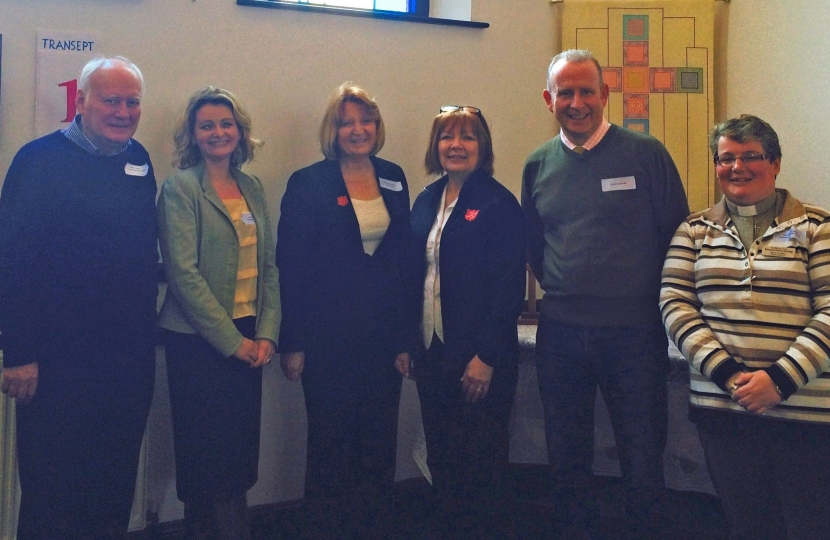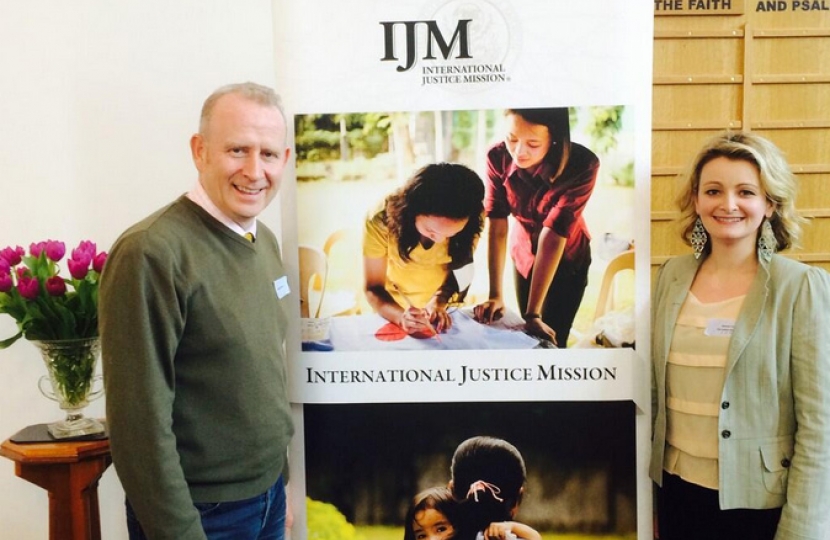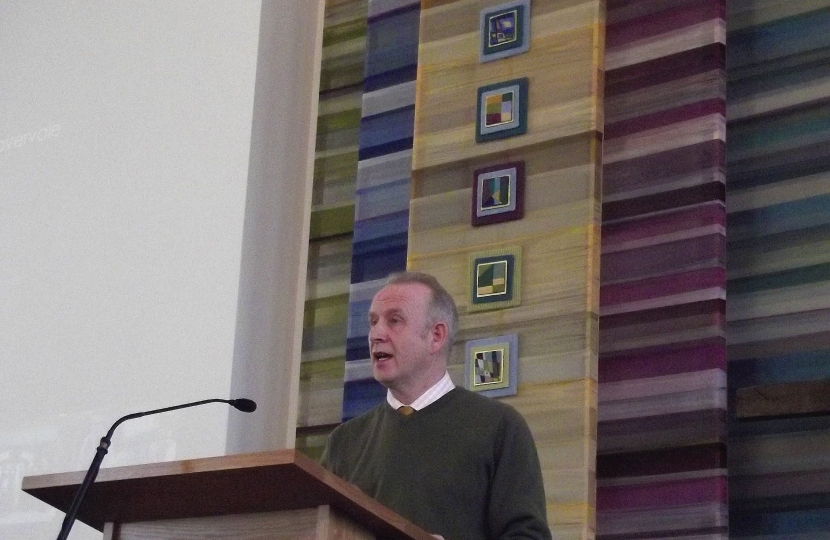Graham Evans MP was proud to speak at a Human Trafficking Forum in Frodsham on Saturday 29 March.
Frodsham and Cheshire Churches Together organised the event with The Salvation Army to discuss human trafficking and the modern day slavery.
Graham delivered a key note speech about the Modern Slavery Bill and the actions that can be taken to protect the most vulnerable in society.
Graham said: "This event was a credit to the local community and it shows clearly the strength of commitment there is here in Weaver Vale to stamp out modern slavery.
"There are an estimated 2,255 people in slavery in this country alone, with almost 21 million men, women and children forced into slavery across the world.
"It is a crime taking place under our very noses, and I am proud that the Government's new Bill will deliver harsher punishments for criminals and better support for victims."
SPEECH IN FULL:
I would like to thank Frodsham and Cheshire Churches Together and the Salvation Army for arranging this Forum on Human Trafficking today.
As the Member of Parliament for Weaver Vale, which includes Frodsham, I have worked closely with the Salvation Army here in Cheshire, and I know the excellent work they do in supporting some of the most vulnerable in society.
I am, therefore, very pleased to follow Major Anne Read today. I would like to thank her, and all those who work with the Salvation Army, for the amazing contribution they make to our society.
I have a special interest in human trafficking. I worked closely with James Brokenshire MP when he was Crime and Security Minister, and he was responsible for the first draft of the Modern Day Slavery Bill. I also continue to work closely with The Human Trafficking Foundation.
It has been over two hundred years since slavery in Britain became a crime under William Wiberforce’s Slave Trade Act of 1807. However, as we here all know, slavery still exists everywhere. Behind closed doors, people of all ages and nationalities are oppressed and abused.
Modern day slavery is a wicked crime. The term encompasses human trafficking, forced labour and domestic servitude. Across the world, across our country, and even here in Cheshire there are people who are forced to work against their will. There are people who are dehumanised and traded as commodities under the threat of physical, emotional or sexual abuse.
It is a modern crime occurring under our own noses.
We cannot know the true scale of modern slavery in the UK and across the world, because its victims suffer in silence.
The International Labour Organisation estimates 21 million men, women and children around the world are in slavery, in a trade worth $32 billion a year.
Even in the UK it is estimated that in 2012 there were up to 2,255 victims of human trafficking. And 1,200 potential victims of human trafficking were identified to the National Referral Mechanism. This was an increase of 25% on the previous year, and this figure is expected to rise further. Two thirds of victims were female, and over 30% were children. Sexual exploitation was the most common reason for their abuse, but the number trafficked for labour is increasing rapidly.
As you know, modern day slavery does not pay attention to nationality, gender or background.
Let me share with you Craig’s story. Craig was starved, beaten, and forced to work 17 hours a day, sleeping on a piece of carpet in a garage. Craig is a vulnerable man with learning disabilities which his abusers, the Rooke Family from Sheffield, ruthlessly exploited. Shockingly, the longest sentence dealt was just 6 and a half years.
This is an appalling story.
However, what makes this even the more poignant, is that Craig is the adopted son of Nick Kinsella, the former head of the UK’s Human Trafficking Centre. His family had no idea of his exploitation, and only discovered his plight when he was hospitalised for his injuries.
This tragic case shows us that anybody can become a victim. It reminds us that cruelty can happen anywhere. And it shows us that action needs to be taken.
I want to speak to you today about three key issues.
The first is how this Government is changing laws to make Britain a world leader in the fight against slavery.
Secondly, the Government’s Modern Day Slavery Action Plan.
And finally, how you can interact with your representative in Parliament to help stamp out slavery.
The Modern Day Slavery Bill was announced by the Home Secretary, Theresa May, in August 2013.
The Bill is a flagship act that will be the first of its kind in Europe. It puts Britain at the forefront of the fight against slavery – both domestically and internationally.
The Bill will clarify legislation, increase sentences for traffickers and enable the courts to restrict activity that puts others at risk. It will mean that more traffickers are identified, disrupted and brought to justice.
The Draft Bill has just been examined by Members of Parliament and Peers who heard from organisations including public bodies, charities, and legal experts. This Committee will now report back to government on its findings.
The Home Secretary also commissioned the Rt Hon Frank Field MP, to chair the Modern Slavery Bill Evidence Review Panel. This panel listened to witness accounts of trafficking victims as well as the organisations fighting this terrible crime. The Field Report makes recommendations for both legislative and non-legislative changes.
The findings of both these reports will lead to revisions of the Bill before it is formally introduced to Parliament for its first reading later this year.
The Draft Bill is made up of four key parts. These are: Offences, civil orders, the establishment of an Anti Slavery Commissioner and changes to the reporting process.
In Part One of the Bill, existing legislation and new offences come together to consolidate and simplify the law whilst allowing for far heavier punishments.
We are creating a new, single offence of human trafficking covering sexual and non-sexual exploitation. This will clearly identify exploitation in all its forms and allow for a simpler prosecution system.
Importantly, the Bill will also tackle the less serious crimes that are committed in preparation to traffic or enslave individuals.
For example, stealing a car with the intention to use it for human trafficking, will be punishable under this Bill. These offences will carry the same punishment as the act of trafficking or exploitation itself.
That means that we can stop a group intending to traffic individuals before it has the chance to commit main crime.
As well as making it easier to prosecute, we are committed to making punishments harsher.
Until now, the maximum single conviction for a trafficking offence was 14 years. Now, Judges will be able to pass life sentences. This is a huge and welcome change in the law.
However, this Bill doesn’t just prosecute criminal activity, it prevents it happening in the first place by shutting down trafficking networks.
Part 2 of the Bill restricts international travel of those convicted, cautioned or even suspected of slavery and trafficking offences.
This means criminal networks and activity will be frozen.
The third part of the Bill will create an important new role – an Anti-Slavery Commissioner – who will lead on the prevention, detection, investigation and prosecution of slavery and trafficking offences.
They will identify and prevent these terrible crimes.
Finally, the fourth part of the Bill will help us understand the true scale of trafficking which has, for too long, been hidden behind closed doors
Too often, Victims have been subject to horrendous psychological, physical or sexual abuse. Some have been betrayed by family and people they thought were friends. Sometimes they do not even see themselves as victims or, because they are forced into a life of crime, they fear not just their traffickers but the authorities who are there to help them.
Because of these issues, many victims are too scared of reprisals to agree to have their circumstances investigated and so their cases go unrecorded.
This part of the Bill would impose a legal duty to notify the National Crime Agency about all suspected cases.
This will lead to a more accurate understanding of the numbers involved in this terrible crime.
I hope you share my belief that these measures offer a wide reaching and comprehensive set of new laws to tackle the planning, action and punishment for these terrible criminal actions.
But, it is not just legislation that we are changing.
The Modern Slavery Action Plan, to be announce in the spring, will implement many of the recommendations of the Field Report.
We have created a Modern Slavery Unit in the Home Office to focus our understanding and approach to these crimes, identifying the ways we can improve the systems here in the UK.
We are also committed to working with foreign governments to strengthen action on slavery. This means sharing knowledge, monitoring borders, and preventing re-trafficking if victims return home.
And we are reviewing the National Referral Mechanism to ensure victims are given access to the best possible government-funded support and assistance, coordinated by the extraordinary Salvation Army.
I am incredibly proud that it is this government that has increased funding so a victim can now have this specialist package of support for not just 30 days, but up to 45 days. Since 2010, more victims have received support than ever before, helping them to recover from their terrible ordeals.
The needs of trafficked children are particularly difficult. That is why a major programme of reform has been put in place by this Government. The aims are: to create stable permanent placements; deliver high quality education and health support; and to better support care leavers as they make the transition to adulthood.
As well as our commitments, both domestic and international, we want more corporate responsibility. Companies must be confident that they do not conduct business with suppliers involved in trafficking.
I am delighted that household names such as Ford, Coco-Cola, Microsoft and Hilton are already taking the initiative themselves. The Home Office will be working with more and more businesses to prevent the exploitation of workers using similar schemes. This includes work with the Gangmasters Licensing Authority, a UK body designed to protect workers across Britain following the Morecombe Bay Cockling Disaster.
The Government, with Virgin Atlantic and Thomas Cook, has already developed a human trafficking training package, to help staff identify and report unusual behaviour. This is a flagship scheme which I would encourage the whole travel industry to replicate.
Our commitment to tackling slavery, both here and abroad, in the public and private sectors proves our commitment to eradicating this most heinous of crimes.
I now want to talk about how I can help you in the fight against human trafficking.
So – what are your options? There are a number of ways you can share your views. You can invite your MP to events like these, you can arrange a time to visit a constituency surgery or you can write to them.
The first step is, unsurprisingly, to find out who your Member of Parliament is.
I am the Member for Weaver Vale. That means that I represent Frodsham, Helsby, Norley, Kingsley, Hartford, Northwich and even part of Runcorn. So if I am your Member of Parliament, do come and say hello.
Remember that your MP is in Parliament to represent your views no matter who you did or did not vote for.
If you want to raise issues about policy, set out your thoughts in writing. Then your Member of Parliament can take your concerns directly to Karen Bradley, the Minister responsible for the new Bill. There is power in numbers. Uniting together to raise issues shows far better the strength of feeling about a specific issue.
If you want to raise awareness about human trafficking, events like these are a fantastic way of drawing media to focus on the issue. Uniting local groups, just like you have done today, maximises local awareness. And it demonstrates to Members of Parliament, like me, just how important this issue is to you all.
Finally, if you have suspicions that anyone is at risk use the services already in place. The police, the local authorities and my office will act on any concerns immediately. We are here to serve you and anyone who needs our help.
I was delighted by the formation of the Global Freedom Network, on 17 March, which is uniting branches of the Christian faith together to fight slavery across the world.
I spoke earlier about William Wilberforce’s crusade to free his fellow man. His work in Parliament cannot be mentioned without referring to his Christian faith. Wilberforce did not campaign as part of a political party but was guided by his belief in the rights of all people to be free. He campaigned with Christian groups across the country and the Commonwealth for a better future.
And here, today, you are carrying on this legacy.
Through the tireless campaigning of groups like yours, slavery was made illegal across the British Empire. And it is through your campaigning now, in the modern day, that we will eradicate slavery together.
I am exceptionally proud to represent an area where the strength of belief in the rights of every person to live free and happy lives, is underpinned by such a strong Christian faith. I am also exceptionally proud to be part of a Government which has shown its commitment to protecting the most vulnerable in society with not just words, but actions.
This year, like 1807 and 1833, will be known as a year when Britain led the world in anti-slavery action.



